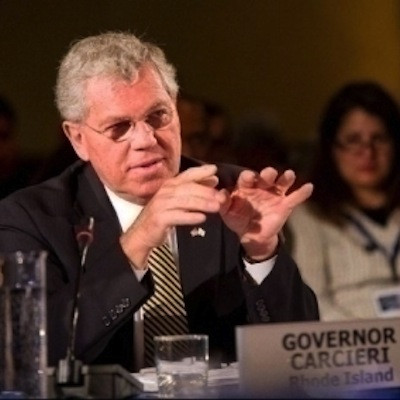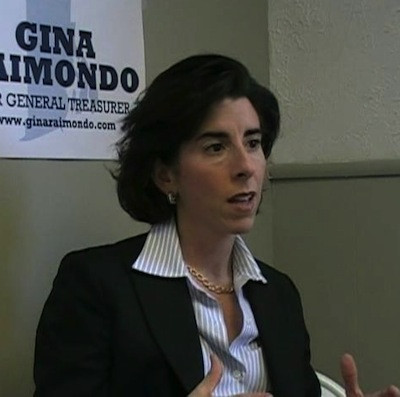Riley: Magaziner Wades Into Rhode Island Municipal Pension Crisis
Tuesday, April 04, 2017
Last week my article focused on a study of the worsening financial status of our cities and towns in Rhode Island. Although it is still not quite complete, my findings point to a clear and approaching disaster in Rhode Island.
Not only did the Rhode Island Pension Commission (2012-2015) accomplish very little of its mission, it may have instead encouraged new types of bad behavior. The commission meetings revealed the hopeless dysfunction of several cities and towns and the fact that their elected leaders had purposely avoided funding the pension plan. This in turn gave them money to spend on other more popular projects.
From Bad to Worse
GET THE LATEST BREAKING NEWS HERE -- SIGN UP FOR GOLOCAL FREE DAILY EBLASTAfter studying the final report of the commission and the minutes of 3 years of meetings, I have concluded the commission made things worse. So, I compiled my own statistics of progress from 2011 to June 2016 from multiple sources and Ii is evident that Rhode Island is now far worse off than expected.
At fault were many well-known elected officials serially misleading taxpayers and possibly engaging in criminal behavior in how they did or did not fund pensions. A central criminal question is “Did they mislead municipal bondholders?” Maybe so, but even after all the evidence has been examined, it doesn’t change the facts that we are broke and thus another question remains “Who should pay for this eventual collapse of mismanaged and underfunded local pension plans?”
The table above shows the progress, or lack thereof, in Municipal Pension Funding from 2012 to 2016.
It also shows each town 2016 prediction submitted in 2012 as part of their FIP (finding improvement plan). Every crisis town submitted a plan for improving the funding ratio and reducing liability over the next 4 years. As you can see from the table, these RI “critical status” towns failed big time. The funded ratio was expected to improve to 46.5%, but instead the ratio worsened from 38.6% to 33.1%. This means the average town in this study has only 33.1% of the funds necessary to pay for work already done. The national average is 75%.
Unfunded liabilities increased by $ 133 million to $ 2.41 billion, an amazing $570 million more than predicted by the FIP’s. Additionally, the actual 2016 return on investments by the chosen town managers was 94% Worse than predicted at a measly 0.44% vs. 7.65%.
Magaziner to the rescue
Rhode Island State law (2010) places the General Obligation Bondholder in first lien position ahead of the retirees, ahead of the taxpayer and ahead of the public employee.
These teetering towns finances have deteriorated over the last several years. Exacerbated by the hapless toothless commission. I have been yelling from the rooftop to “save the State Taxpayer from bailing out Providence” I am not sure what triggered Treasurer Magaziner’s announcement of a plan to quarantine these “critical status” pension plans and then merge them into MERS (the state run plan). I am sure its political.
However, I agree with the notion that these towns have forever lost their privilege of managing a defined benefit plan. Someone needs to remove this tempting money pot from the control of sneaky and disingenuous finance directors, mayors and councils. Unfortunately, existing state laws, such as the required contribution of 100% or ARC, are completely toothless and everyone knows it. Mayors like Joe Polisena of Johnston openly refuse to fund pensions at all.
“Our approximation is anywhere from five to seven years,” he said of the lifespan until local pension plans are bankrupt.
Polisena, who receives a pension for his 20 years on the fire department, does not believe tax increases are an option either, especially because to cover costs it would well exceed the state cap on how much taxes can be increased in a single year.
“There’s no way there will be a taxpayer bailout to pay for pensions – that’s not the legacy I want to have,” he said. “The system is broken and it can’t be fixed with money.”
Readers know that I’ve been a longtime critic of the pension commission and Ms. Raimondo’s surprising lack of focus on municipal stress.
Although Mr. Magaziner’s’ attempt to address the crisis is welcome, upon reading the details of the proposed legislation I find many of the same problems that plagued the commission. They include lack of accountability, ridiculously low compliance standards and virtually no penalties for negligence or fraud. This makes the proposal a non-starter. A glaring issue is that both Johnston and Providence are belligerent and broke. Then there is the issue of Rhode Island Treasury managing this “critical status” Quarantine plan. Treasurer Magaziner has a lousy money management record and who needs adding this to our State bureaucracy anyway? Next week, a better proposal for the important effort by our Treasurer.
Michael G. Riley is vice chair at Rhode Island Center for Freedom and Prosperity and is managing member and founder of Coastal Management Group, LLC. Riley has 35 years of experience in the financial industry, having managed divisions of PaineWebber, LETCO, and TD Securities (TD Bank). He has been quoted in Barron’s, Wall Street Transcript, NY Post, and various other print media and also appeared on NBC News, Yahoo TV, and CNBC.
Related Slideshow: Timeline - Rhode Island Pension Reform
GoLocalProv breaks down the sequence of events that have played out during Rhode Island's State Employee Pension Fund reform.
Related Articles
- Riley: Did Smiley Use Bankruptcy Threat to Get Grant, Proving Prov is Lying?
- Riley: Providence in Big Trouble - Pension Plan Assets Lowest Since 2007
- Riley: Lousy Pension Returns Put One More Nail in Providence Coffin
- Riley: Close, But No Cigar for Providence
- Riley: More Providence Pension Abuse of Public Employees
- Riley: A New Low Cost Strategy for Treasurer Magaziner
- Riley: Brexit Slams RI Pension Funds
- Riley: Magaziner Drowning in Raimondo’s Hedge Funds Gone Wild
- Riley: Pension Assets Valuation Scam, Elorza Style
- Riley: No Need for Commission
- Riley: Time to Ditch Hedge Fund Strategy
- Riley: Time to End Politics in the Rhode Island Treasury
- Riley: Outside Forensic Audit Will Show Providence Financial Lies
- Riley: Pros Predictions for Beating the Treasurer in 2017
- Riley: Beat the Treasurer
- Riley: President Trump Helps Magaziner to First Positive Annual Return
- Riley: Barron’s Touts Dow 30,000 Unfortunately RI Needs Dow 45,000
- Riley: Time to Review Why 16 RI Municipal Pension Funds Shouldn’t Be Shut Down
- Riley: 2017 RI Projected Pension Returns Scary and Worsening
- Riley: Donald Trump Involved With Ponzi Scheme Criminals?
- Riley: Will Trump’s SEC Chair Go After Misleading Mayors?
- Riley: Raimondo’s Biggest Problem is Providence
- Riley: Did Stock Market Rally Under Trump Help Rhode Island?
- Riley: Investment Fee Abuse in Rhode Island Public & Private Investments
- Riley: Politics and Pensions - Has Raimondo Given Up?









































